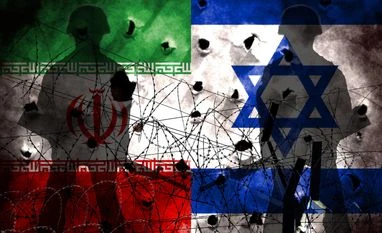By Marc Champion
There are good reasons for Israel not to hit Iran’s nuclear program in its coming retaliation against the Islamic Republic. Yet the logic for a preemptive strike has never been as compelling, precisely because Tehran’s case for building a nuclear arsenal has also never been as strong. This is inherently unstable — and dangerous.
The last few weeks have transformed Iran’s security situation, no less than Israel’s. Until then, Hezbollah, the Lebanese militia that Iran’s Islamic Revolutionary Guard Corps (IRGC) spent decades nurturing to threaten Israel had looked formidable. But after one of the most effective decapitation operations in military history, Iran can no longer rely on Hezbollah for its “forward defense.” Hezbollah’s troops are in fight for their own survival.
The need to reestablish this lost deterrence - to demonstrate to Israel that Iran remains capable of inflicting unacceptable damage in response to any direct attack - led directly to Tuesday’s massed ballistic missile strike. This was, as I wrote at the time, a strategic mistake.
Unlike a previous such demonstration in April, Iran’s missile command was really trying this time. They gave no lengthy notice. They used only the most potent weapons in the Iranian arsenal, ballistic missiles, and these were bunched so as to saturate and penetrate Israel’s air defenses. A significant number made it through, yet their impact appears to have been minimal.
This has created the worst of all worlds. What the strike in fact demonstrated was Israel’s ability to absorb Iran’s best shot. The targets were largely military bases, including airfields, and initial reports suggest the damage sustained was limited. Israel has long prepared for this, and not just by developing air defenses. Civilians have bunkers to go to. Aircraft aren’t kept out in the open, but under hardened shelters.
More From This Section
The more disturbing message was that had those missiles been tipped with nuclear warheads, rather than conventional ones, the destruction would be existential. So, between the outcome of two massive conventional missile strikes and Hezbollah’s incapacitation, it’s now clear to both sides that Iran has no effective deterrent against an Israeli attack — unless and until Iran develops a nuclear arsenal.
As a commentary in the IRGC-affiliated Javan, or Youth, publication lamented, Iran can work with its partners in the Axis of Resistance to try restoring some measure of deterrence, but against the technological superiority Israel has shown it’s unlikely to be enough. The obvious solution was “a change in Iran's nuclear doctrine,” from civilian to military, the author wrote, adding that Iran now has the capacity to do that quickly.
To be very clear, the original sin here lies with Iran. Its leaders probably didn’t design, or perhaps even know about, the Oct. 7 Hamas attack that led to this crisis. Yet Iran’s leadership celebrated the butchery and saw Israel’s response as an opportunity to weaken the Jewish state. It activated really for the first time, a coordinated attack on Israel by the so-called Axis of Resistance that surrounds it. Supreme Leader Ali Khamenei could have told Hezbollah to stop shelling Israel; he could have told the Houthis to stop firing on global shipping lanes. He chose not to.
No doubt Khamenei thought he was winning, just as Israel’s Prime Minister Benjamin Netanyahu thinks he’s winning now. Who, after all, truly knew that Israel’s intelligence services had so thoroughly penetrated Hezbollah that they’d be able to blow up its pagers and target and kill its leaders at secret meetings? Certainly not Khamenei.
What hasn’t changed in recent weeks is that Iran spent the last decade hardening its nuclear program against attack, with the most valuable equipment literally buried under mountains. Eliminating the program is likely impossible, while to try and fail is almost guaranteed to trigger an Iranian dash for the bomb. Any serious attempt, moreover, would require a massive attack of the kind that can only be carried out with US participation.
A further constraining factor is that ordinary Iranians are potentially Israel’s best allies in its goal of unseating Khamenei’s regime, because they despise it. Netanyahu knows this. In a recent broadcast, he appealed to the Iranian people directly. Any attack that causes collateral damage to civilians — in particular radioactive fallout from any strike on enriched uranium stores — would risk provoking a rally-around-the-flag effect that, for Israel, would be self-defeating.
Israel will likely focus on non-nuclear targets; this time, perhaps Iran’s air defenses and missile launchers, or its energy structure. Whether that will achieve much more than a further round of escalatory strikes is unclear. Yet the die seems cast. Israel will retaliate to this week’s missile attack, and Tehran will likely follow through on its threats to respond. An Iranian nuclear breakout, and an Israeli strike to prevent it, have drawn closer.
Disclaimer: This is a Bloomberg Opinion piece, and these are the personal opinions of the writer. They do not reflect the views of www.business-standard.com or the Business Standard newspaper
Disclaimer: This is a Bloomberg Opinion piece, and these are the personal opinions of the writer. They do not reflect the views of www.business-standard.com or the Business Standard newspaper
)